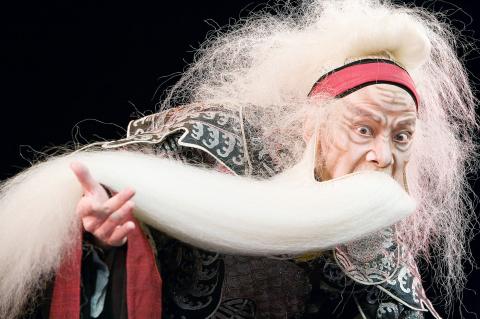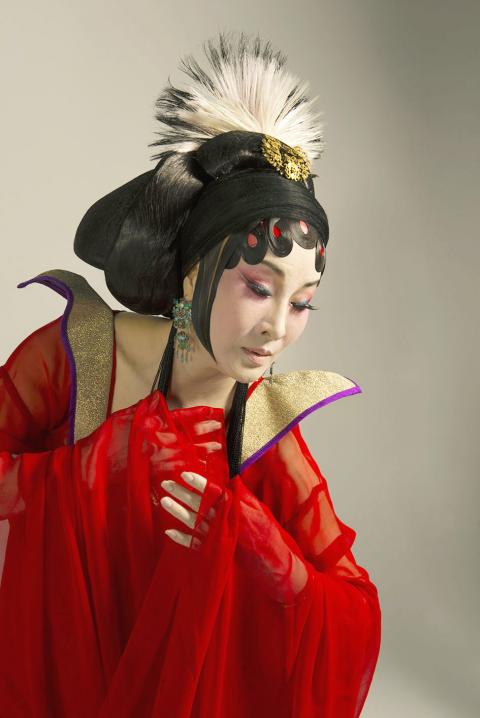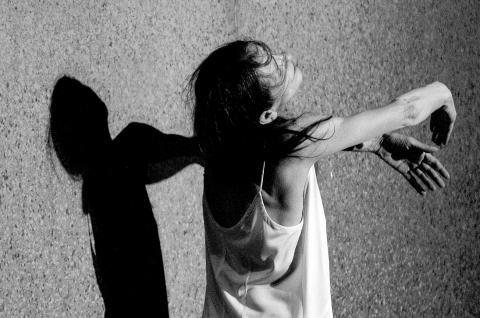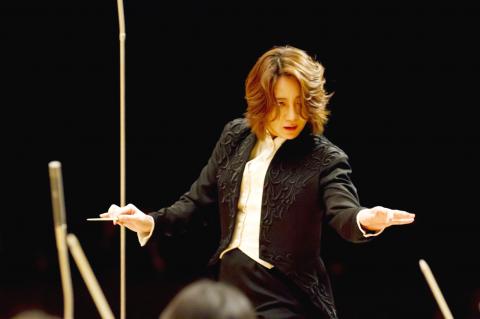Born out of the need to have a large, comprehensive cultural event in southern Taiwan, the Kaohsiung Spring Arts Festival (高雄春天藝術節) spreads out its bulging lineup of more than 30 productions and nearly 70 performances across three sites over the course of four months. The festival began at the end of last month.
The festival has become an increasingly important platform and source of support for local groups. Participating companies and individual artists come from 14 countries including Japan, France, Greece and the UK. It will be given an added boost as several of the top international and national acts participating in the Taiwan International Festival of Arts (台灣國際藝術節, TIFA), currently running in Taipei, will head down to Kaohsiung to give performances.
Now in its fourth year, the festival is a major undertaking by the city’s culture bureau, in collaboration with the Kaohsiung Philharmonic Cultural and Arts Foundation (高雄市愛樂文化藝術基金會) and the Kaohsiung Culture Foundation (高雄市文化基金會). Its main objective is to cultivate audiences, support the growth of local companies and foster local theater said Wu Cheng-ting (吳正婷), director of the city bureau’s Performing Arts Development Center.

Photo Courtesy of Dirk Bleicker, KSAF
“Especially with the coming of Wei Wu Ying Center for the Arts (衛武營藝術文化中心), we will need a strong audience base and thriving arts communities here in Kaohsiung. It will be a long process,” Wu told Taipei Times.
Dubbed the National Theater Concert Hall of southern Taiwan, the Wei Wu Ying Center for the Arts is currently under construction and is set to start operating in 2015.
Wu said that changes have been apparent over the past four years. Before, theater workers and technicians such as lighting engineers and costume designers were recruited from the north. Now the organizers begin to see theater graduates from universities in Kaohsiung and other neighboring cities joining the festival.

Photo Courtesy of KSAF
The festival has sought partnership with TIFA since its inception in 2010 to broaden the appeal and pave way for the Wei Wu Ying, which will be the TIFA’s close ally. This year’s performances that come down from the NTCH extravaganza includes Attis Theater’s epic production Prometheus Bound from Greece and Taiwan’s Flowing Sleeves and Rouge (水袖與胭脂) by the Guo Guang Opera Company (國光劇團), a self-referential work that takes a look at Beijing opera from an actor’s perspective.
Some of the festival’s international acts are staged only in Kaohsiung. Among them, The Arrival by New Zealand’s Red Leap Theatre will have its Taiwan premiere tomorrow, bringing to local audiences an imaginative tale about human migration and dislocation. The play was adapted from the award-winning graphic novel of the same title by Shaun Tan, an Australian writer of Malaysian descent.
Emphasis is also placed on collaborations between local arts groups since the organizers see mutual support and collaboration among companies as a way to facilitate creativity and push artistic limits, according to Wu. One example can be found in The Treasures of Hundred Years (一百年的寶藏), a co-production between Fan-mei Dance Group (汎美舞蹈團) and Bean Theatre (豆子劇團), one of the few children’s theater groups in Kaohsiung. It is a musical performed in Mandarin and Hoklo (commonly known as Taiwanese) and meant for families.

Photo Courtesy of Paulo Pimenta, KSAF
One of the southern harbor city’s proud specialties, Taiwanese gezai opera (歌仔戲), has been an important element of the festival. This year’s lineup features new work by local operatic groups including Chun Mei Taiwanese Opera Troupe (春美歌劇團) and Sun Hope Taiwanese Opera Troupe (尚和歌仔戲劇團) as well as heavy-weight Tang Mei Yun Taiwanese Opera Company’s (唐美雲歌仔戲團) latest production, Deathless Beauty (燕歌行).
For lovers of modern dance, Germany’s Tanztheater Wuppertal Pina Bausch will bring Cafe Muller and Le Sacre du Printemps down to the south after four shows at the National Theater in Taipei.
In the realm of music, Japanese conductor Tomomi Nishimoto will lead the Kaohsiung City Symphony Orchestra (高雄市交響樂團) and violinist Sayaka Shoji for a concert tomorrow night. Next month, the orchestra will team up with conductor Chen Mei-an (陳美安) and violinist Anne Akiko Meyers.

Photo Courtesy of KSAF
With its diverse roster, the event has programs for everyone and offers discount packages for transportation via high-speed rail. For a complete listing of the festival’s programs, related events, ticket packages and other information, go to the festival’s main Web site at www.ksaf.com.tw.

June 9 to June 15 A photo of two men riding trendy high-wheel Penny-Farthing bicycles past a Qing Dynasty gate aptly captures the essence of Taipei in 1897 — a newly colonized city on the cusp of great change. The Japanese began making significant modifications to the cityscape in 1899, tearing down Qing-era structures, widening boulevards and installing Western-style infrastructure and buildings. The photographer, Minosuke Imamura, only spent a year in Taiwan as a cartographer for the governor-general’s office, but he left behind a treasure trove of 130 images showing life at the onset of Japanese rule, spanning July 1897 to

In an interview posted online by United Daily News (UDN) on May 26, current Chinese Nationalist Party (KMT) Chairman Eric Chu (朱立倫) was asked about Taichung Mayor Lu Shiow-yen (盧秀燕) replacing him as party chair. Though not yet officially running, by the customs of Taiwan politics, Lu has been signalling she is both running for party chair and to be the party’s 2028 presidential candidate. She told an international media outlet that she was considering a run. She also gave a speech in Keelung on national priorities and foreign affairs. For details, see the May 23 edition of this column,

The Taiwan People’s Party (TPP) on May 18 held a rally in Taichung to mark the anniversary of President William Lai’s (賴清德) inauguration on May 20. The title of the rally could be loosely translated to “May 18 recall fraudulent goods” (518退貨ㄌㄨㄚˋ!). Unlike in English, where the terms are the same, “recall” (退貨) in this context refers to product recalls due to damaged, defective or fraudulent merchandise, not the political recalls (罷免) currently dominating the headlines. I attended the rally to determine if the impression was correct that the TPP under party Chairman Huang Kuo-Chang (黃國昌) had little of a

At Computex 2025, Nvidia CEO Jensen Huang (黃仁勳) urged the government to subsidize AI. “All schools in Taiwan must integrate AI into their curricula,” he declared. A few months earlier, he said, “If I were a student today, I’d immediately start using tools like ChatGPT, Gemini Pro and Grok to learn, write and accelerate my thinking.” Huang sees the AI-bullet train leaving the station. And as one of its drivers, he’s worried about youth not getting on board — bad for their careers, and bad for his workforce. As a semiconductor supply-chain powerhouse and AI hub wannabe, Taiwan is seeing